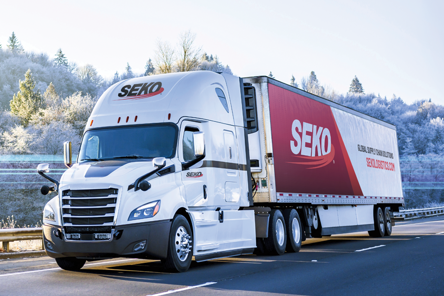Do you need help navigating the complex world of logistics? The explosion of ecommerce and an increasingly globalized market make supply chain optimization a vital component in your competitive strategy.
Enter third-party logistics (3PL) and fourth-party logistics (4PL) providers—your keys to building a streamlined and efficient supply chain. But how do you choose between the two?
In this article, we'll dive deep into the world of 3PLs and 4PLs, demystifying their roles, responsibilities, and differences to help you make the right choice for your business.
WHAT IS A FOURTH-PARTY LOGISTICS PROVIDER (4PL)?
A fourth-party logistics provider (4PL) is a logistics partner that takes on a higher level of supply chain management compared to third-party logistics providers (3PL). A 4PL company oversees and coordinates the entire supply chain process, including managing 3PLs, optimizing operations, integrating technologies, and providing end-to-end logistics solutions.
WHAT ARE THE RESPONSIBILITIES OF A 4PL?
To make an informed decision about which logistics provider is best for your business, it’s essential to understand the roles and responsibilities of a 4PL (fourth-party logistics) company. From managing 3PLs to coordinating your entire supply chain, 4PLs can revolutionize your logistics operations.
WHAT IS A THIRD-PARTY LOGISTICS PROVIDER (3PL)?
A 3PL (third-party logistics provider) is a company that specializes in various logistics services such as warehousing, transportation, and order fulfillment. 3PLs serve as the intermediary between your company and the carriers that deliver your products to customers. To learn more about 3PLs, read our previous article: 3PL vs. In-house: What’s the Difference.
- 3PL MANAGEMENT: Oversee and coordinate the activities of multiple 3PL partners.
- OPTIMIZE OPERATIONS: Continuously identify opportunities for operational efficiency and cost savings.
- COORDINATE SERVICES: Ensure smooth communication and collaboration between all logistics providers.
- INTEGRATE TECHNOLOGIES: Implement advanced technology solutions to improve visibility and control throughout the supply chain.
- COMPLETE SUPPLY CHAIN MANAGEMENT: Develop and execute comprehensive logistics strategies.
WHAT IS THE DIFFERENCE BETWEEN 3PL AND 4PL?
Navigating the logistics landscape can be challenging, especially when distinguishing between the unique services and roles of 3PLs and 4PLs in supply chain management. There are some key differences between 3PLs and 4PLs, ranging from areas of focus to their distinct operational approach. With a solid understanding of these differences, you can choose which provider best aligns with your needs and growth objectives. See the table below to learn more.
|
3PLs |
4PLs |
|
|
Order Fulfillment |
3PLs handle the physical movement of goods |
4PLs manage the entire fulfillment process, including coordinating with 3PLs |
|
Supply Chain Optimization |
3PLs focus on specific logistics functions |
4PLs develop comprehensive supply chain strategies |
|
Communications |
3PLs’ communication mainly revolves around their individual logistics services |
4PLs act as a single point of contact for all supply chain activities, streamlining communication between various logistics partners |
|
Areas of Focus |
3PLs specialize in specific logistics services, such as warehousing, transportation, and order fulfillment |
4PLs offer end-to-end supply chain management solutions |
|
Relationships |
3PLs’ relationships are often more transactional, concentrating on ensuring efficient execution of the agreed-upon tasks |
4PLs often have stronger, long-term partnerships with clients, 3PLs and other logistics providers |
|
Resources |
3PLs typically own physical assets, like trucks and warehouses |
4PLs rely on their strategic management capabilities |
HOW DOES THE 4PL PROCESS DIFFER FROM A 3PL?
A 3PL's process mainly focuses on the execution of specific logistics operations. They provide the assets and infrastructure necessary to move products efficiently within the supply chain.
On the other hand, a 4PL's process takes a more strategic approach, overseeing and managing the entire supply chain. They optimize your logistics operations by leveraging advanced technology, data analysis, and supply chain engineering to improve end-to-end performance.
The key difference between the two lies in their level of responsibility and control. Here’s how each process plays out.
THE 3PL PROCESS:
- RECEIVING INVENTORY: Accept shipments from suppliers and confirm the accuracy of delivered goods.
- WAREHOUSING: Store products in an organized and efficient manner to ensure easy access and retrieval.
- INVENTORY MANAGEMENT: Track product levels, monitor stock movements, and maintain accurate records for inventory control.
- ORDER PROCESSING: Receive, process, and prepare customer orders for shipping.
- SHIPPING: Coordinate with carriers, arrange transportation, and ship products to customers according to required delivery times.
- RETURNS MANAGEMENT: Handle product returns, process refunds, and manage reverse logistics to get products back into inventory or dispose of them.
- REPORTING & ANALYTICS: Provide data and insights on warehouse operations, inventory, and order fulfillment performance to help clients make informed decisions.
THE 4PL PROCESS:
- STRATEGY DEVELOPMENT: Analyze logistics requirements and develop a tailored strategy to optimize supply chain performance.
- PROVIDER SELECTION: Identify, select, and manage the best-suited 3PLs and other service providers to ensure efficient operations.
- INTEGRATION & COORDINATION: Synchronize and oversee all logistics activities across multiple providers for streamlined execution.
- TECHNOLOGY IMPLEMENTATION: Deploy and manage advanced technology systems to enable real-time visibility, communication, and analytics.
- SUPPLY CHAIN OPTIMIZATION: Continuously assess and improve logistics processes, identify bottlenecks, and implement cost-effective measures.
- PERFORMANCE MANAGEMENT: Monitor key performance indicators (KPIs) and provide data-driven insights to clients for informed decision-making.
- COLLABORATION & INNOVATION: Work closely with you and logistics partners to drive continuous improvements and innovation in the supply chain.
HOW DO 4PLS AND 3PLS WORK TOGETHER?
3PLs and 4PLs collaborate to deliver an end-to-end supply chain solution. The 4PL acts as a strategic orchestrator, managing the entire supply chain and coordinating the logistics functions performed by 3PLs. This cooperation allows the 4PL to optimize supply chain operations for maximum efficiency and cost-effectiveness.
The 4PL offers guidance and support to 3PLs to enhance their performance and streamline their processes. In this partnership, the 4PL and 3PL play vital roles, with the 4PL focusing on strategic oversight and integration while the 3PL executes specific logistics services. This collaborative partnership ensures a well-managed and high-performing supply chain.
3PL VS 4PL: WHICH IS RIGHT FOR YOUR BUSINESS?
Choosing between a 3PL or 4PL provider for your business involves assessing various factors that influence your supply chain’s efficiency. We’ve created a list of key factors you should consider to help you determine which logistics provider best aligns with your company’s needs and objectives.
KEY FACTORS TO CONSIDER:
- BUSINESS SIZE & COMPLEXITY: Smaller businesses with less complex supply chains may benefit more from 3PL partners. Enterprise-level businesses with intricate supply chains may require the comprehensive management offered by 4PL partners.
- CONTROL & INVOLVEMENT: If you want to maintain more control and direct involvement in your supply chain management, a 3PL partner may be a better choice. On the other hand, if you prefer to delegate logistics operations to an outside expert, a 4PL partner may be more suitable.
- SCALABILITY: If your business anticipates significant growth in the future, partnering with a 3PL may provide more flexibility to adapt to changes. 4PLs may offer better solutions for businesses that need comprehensive management and coordination across multiple 3PLs.
- COST: Typically, 4PL partners charge a premium for their services due to their expertise and the more extensive range of responsibilities they undertake. Consider your budget and the potential return on investment when deciding between a 3PL or 4PL partner.
- INTEGRATION OF TECHNOLOGY: 4PLs are known for their ability to integrate advanced technology into supply chain management for optimization and better control. You may find a 4PL more suitable if you seek robust technological integration.
Read Dell EMC’s case study to learn how SEKO integrated global technology with its unique Transport Management System.
- GEOGRAPHIC REACH: Depending on the scope of your business, it’s essential to consider the geographic reach of your potential logistics partner. Some 3PLs may be more regional, while 4PLs usually offer global coordination and management.
- RANGE OF SERVICES: 3PLs generally provide targeted services like transport, warehousing, and completing orders. In contrast, 4PLs manage a more extensive array of services, encompassing the supervision of multiple 3PLs, comprehensive supply chain enhancement, and orchestration of diverse logistics functions.
HOW SEKO CAN HELP
SEKO is a leading 3PL partner that offers comprehensive logistics services tailored to your specific needs, including transportation, warehousing, order fulfillment, and end-to-end supply chain management solutions.
With a 45-year proven track record of success, we have helped countless businesses streamline their supply chain operations through advanced technology integration, global coverage, and scalable services.
Trust an award-winning logistics provider to handle your needs and watch your business thrive with our customized, efficient, and reliable solutions. Ready to explore what SEKO can do for you? Schedule a call with our logistics experts today!





